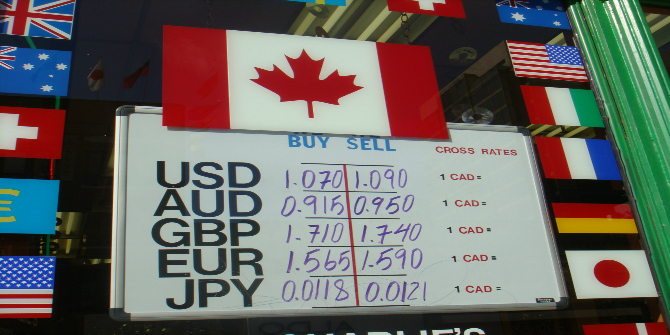 Nearly 25 years later, Bill Clinton’s campaign strategy of “the economy, stupid” holds true as ever. But do voters actually agree on how well the economy is doing, especially at the local level? In new research, Jonathan Rogers finds that Tea Party supporters were much more likely to think that their local economy was getting worse, despite the fact that their local unemployment rate was improving, and that they were not more likely to live in economically deteriorating areas.
Nearly 25 years later, Bill Clinton’s campaign strategy of “the economy, stupid” holds true as ever. But do voters actually agree on how well the economy is doing, especially at the local level? In new research, Jonathan Rogers finds that Tea Party supporters were much more likely to think that their local economy was getting worse, despite the fact that their local unemployment rate was improving, and that they were not more likely to live in economically deteriorating areas.
As the US hurtles toward the 8 November general election, pundits and forecasters will repeat the well-worn phrase that it’s “the economy, stupid.” If the economy is doing well, then the incumbent party will be rewarded at the polls. If it is doing poorly, then the people will vote for change. This however, requires that voters are at least trying to neutrally evaluate the economy. Voters who are angry for any number of other reasons are more likely to report that the economy is suffering. They have already made up their minds that they dislike the current administration and say that the economy is getting worse to justify their discontent. This can be the case, even if the economy is objectively doing well.
That the state of the economy affects vote choice is not a new idea. What is unclear is what aspects of the economy matter to voters and if voters have accurate perceptions of these economic conditions. A growing body of literature argues that people care about national economic conditions, but also separately about those in their own communities.
If people care about local economic conditions, then it is important to understand why they think that the community is prospering or not. Common measures of local conditions include unemployment, local Gross Domestic Product (GDP) growth, and change in population. Ostensibly, a thriving community would have low unemployment, growing GDP, and an increasing population through in-migration. If communities have these traits and people notice them, then they should agree that the local economy is strong.
But this is not always the case. Heavily polarized politics in the US has given rise to widespread motivated reasoning. That is, some voters are living in their own reality, as defined by their politics. Ignoring objective indicators of economic conditions, voters who are happy with the current administration are more likely to say that the economy is doing well. Those who are angry with the incumbent administration are more likely to report that it is suffering. We saw this in 2010, with the rise of the Tea Party.
While the Tea Party movement has since been coopted by the Republican Party, in its early days it was more of an expression of outrage at government spending and overreach, as well as personal displeasure with President Obama. A common complaint from Tea Party activists was that choices made by the administration were hurting local jobs. If locally deteriorating conditions were causing Tea Party support, then local conditions would have to actually be deteriorating in places where Tea Party supporters lived. This was not the case. Figure 1 uses data from the 2010 Cooperative Congressional Election Study to show that those who held a positive view of the Tea Party were much more likely to report that their local economy was getting worse. I then matched the same survey respondents with Metropolitan Statistical Area (urban areas and surrounding counties) unemployment data from the Bureau of Labor Statistics. Not only were most respondents living in places where unemployment was slowly improving, but Tea Party supporters were no more likely to live in deteriorating areas than anyone else nor were they any more likely to live in an area of high unemployment.
Figure 1 – Tea Party supporters in 2010 believed that their local economies were getting worse (click to enlarge)
Figure 2 – Objective conditions did not explain support for the Tea Party in 2010 (click to enlarge)
In fact, support for the Tea Party was the single strongest predictor that a respondent would claim that the local economy was getting worse. It outweighed other expected sources of bias including ideology, party affiliation, education, income, and the respondent’s unemployment status. That said, actual local unemployment rates did matter. Those who lived in metropolitan areas with higher unemployment were more negative in their responses. This means that people do tend to be aware of objective local conditions, but those who are angry have their judgment clouded.
The implications for the 2016 US Presidential Election are clear. Surveys will show that voters used the state of the economy to help them decide which candidate to choose, but the effect will be overstated. In a political environment where a subset of voters is more attached to their team than to choosing the best candidate, evaluations will be biased. Donald Trump supporters will be more likely to say that things are getting worse, even if they live in strong communities. There could be a smaller, but reverse effect for Hillary Clinton supporters. I say smaller, as while they may also engage in motivated reasoning, the Democrats are the incumbent party in the White House and conditions (at least as measured by unemployment) have slightly improved over the past year. But the point remains that economic conditions will affect the outcome, like they do in most elections, but the economy people are evaluating may be real or it may be imagined.
This article is based on the paper, ‘Tea Party support and perceptions of local economic conditions’, in Electoral Studies.
Featured image credit: Steve Snodgrass (Flickr, CC-BY-2.0)
Please read our comments policy before commenting.
Note: This article gives the views of the author, and not the position of USApp– American Politics and Policy, nor of the London School of Economics.
Shortened URL for this post: http://bit.ly/2eQyFOm
______________________
 Jonathan Rogers – New York University Abu Dhabi
Jonathan Rogers – New York University Abu Dhabi
Jonathan Rogers is an Instructor of Political Science at New York University Abu Dhabi. His research focuses on the negative aspects of voting and economic behavior: frustration, cheating, spite, and discrimination. His recent publications appear in Political Science Research and Methods, Electoral Studies, and Economic Inquiry.








